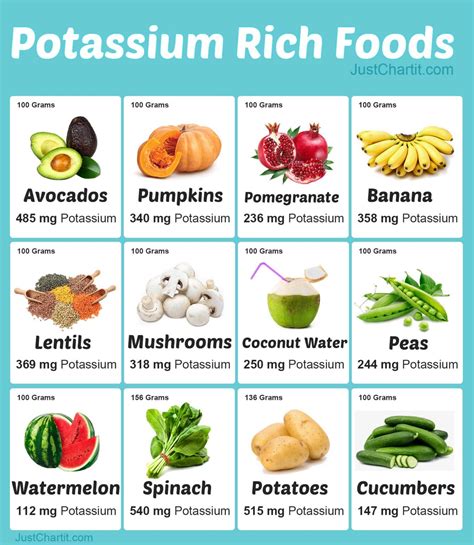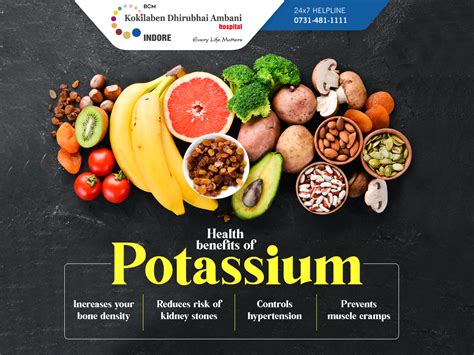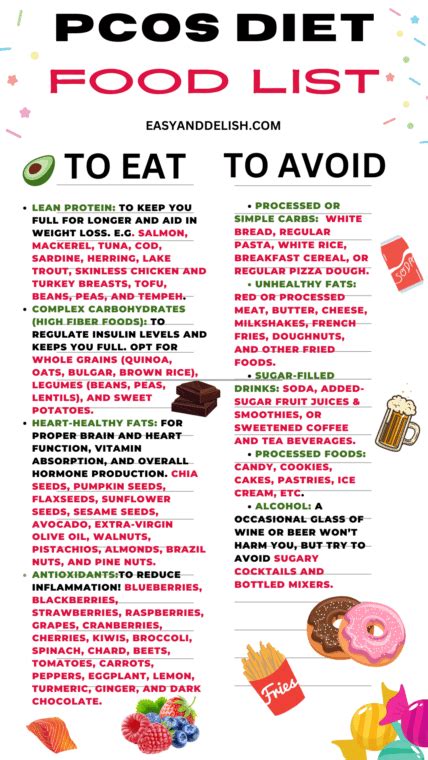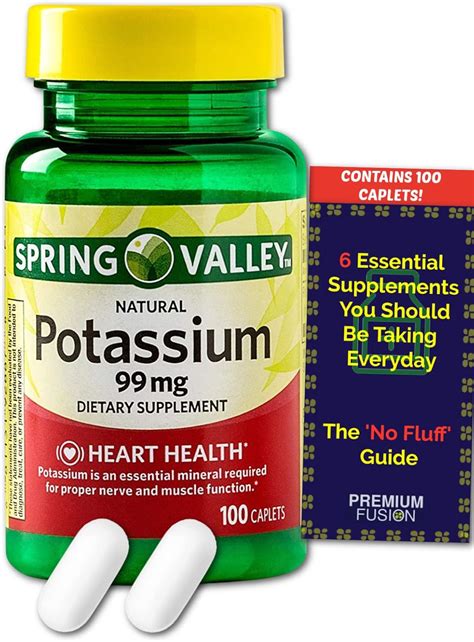Intro
Potassium is an essential mineral that plays a critical role in maintaining various bodily functions, including heart health, blood pressure regulation, and muscle function. It is a vital component of a balanced diet, and consuming foods rich in potassium can help prevent deficiencies and promote overall well-being. With a plethora of potassium-rich foods available, it's easier than ever to incorporate this essential mineral into your daily meals.
A diet rich in potassium can have numerous health benefits, including reducing the risk of heart disease, stroke, and kidney stones. Potassium helps to lower blood pressure by balancing out the effects of sodium in the body, reducing the strain on the cardiovascular system. Additionally, potassium is essential for maintaining healthy muscles and nerves, making it a crucial nutrient for athletes and individuals who engage in regular physical activity.
The importance of potassium in our diet cannot be overstated, and it's essential to be aware of the foods that are rich in this mineral. By making informed choices about the foods we eat, we can ensure that we're getting enough potassium to maintain optimal health. Whether you're looking to improve your overall well-being or address a specific health concern, incorporating potassium-rich foods into your diet is a great place to start.
Potassium Rich Foods

Top Potassium Rich Foods
Some of the top potassium-rich foods include: * Spinach: 1 cup cooked = 840 mg of potassium * Sweet potatoes: 1 medium = 542 mg of potassium * Avocados: 1 medium = 708 mg of potassium * Bananas: 1 medium = 422 mg of potassium * White beans: 1 cup cooked = 1,189 mg of potassium * Salmon: 3 oz = 534 mg of potassium * Mushrooms: 1 cup grilled = 555 mg of potassium * Peas: 1 cup cooked = 434 mg of potassiumBenefits of Potassium Rich Foods

Potassium Deficiency
A potassium deficiency can have serious health consequences, including muscle weakness, fatigue, and heart palpitations. If left untreated, a potassium deficiency can lead to more severe health problems, such as respiratory failure and cardiac arrest. It's essential to be aware of the signs and symptoms of a potassium deficiency, which may include: * Muscle weakness or cramps * Fatigue or lethargy * Heart palpitations or arrhythmias * Constipation or abdominal cramps * Bloating or water retentionFoods to Avoid

Increasing Potassium Intake
Increasing potassium intake can be as simple as making a few tweaks to your daily diet. Some ways to boost potassium intake include: * Eating more fruits and vegetables: Fruits and vegetables are some of the richest sources of potassium, making them a great addition to a healthy diet. * Incorporating lean proteins: Lean proteins like salmon and chicken are good sources of potassium, making them a great addition to meals and snacks. * Using herbs and spices: Herbs and spices like garlic and basil are rich in potassium, making them a great way to add flavor and nutrition to meals. * Drinking potassium-rich beverages: Beverages like coconut water and milk are rich in potassium, making them a great way to boost intake.Potassium Supplements

Precautions and Interactions
When taking potassium supplements, it's essential to be aware of the potential precautions and interactions. Some of the precautions and interactions to be aware of include: * Medication interactions: Potassium supplements can interact with certain medications, such as blood thinners and diuretics, making it essential to talk to a healthcare provider before taking any supplement. * High doses: Taking high doses of potassium supplements can cause adverse effects, such as muscle weakness, fatigue, and heart palpitations. * Kidney problems: Individuals with kidney problems should be cautious when taking potassium supplements, as they can worsen kidney function.Potassium Rich Foods for Athletes

Post-Workout Nutrition
Post-workout nutrition is essential for athletes and individuals who engage in regular physical activity. Some of the best post-workout foods and beverages include: * Protein shakes: Protein shakes are a convenient and easily digestible source of protein and potassium, making them a great post-workout snack. * Banana and peanut butter: Banana and peanut butter is a classic post-workout snack that is rich in potassium and protein. * Sweet potato and chicken: Sweet potato and chicken is a complex carbohydrate and protein-rich meal that is perfect for post-workout nutrition. * Coconut water: Coconut water is a natural source of potassium and electrolytes, making it a great beverage for athletes to drink during and after exercise.What are the symptoms of a potassium deficiency?
+The symptoms of a potassium deficiency can include muscle weakness, fatigue, and heart palpitations. If left untreated, a potassium deficiency can lead to more severe health problems, such as respiratory failure and cardiac arrest.
What are the best sources of potassium?
+The best sources of potassium include leafy greens like spinach and kale, as well as fruits like bananas and avocados. Legumes, such as white beans and lentils, are also excellent sources of potassium.
Can I take potassium supplements if I have kidney problems?
+Individuals with kidney problems should be cautious when taking potassium supplements, as they can worsen kidney function. It's essential to talk to a healthcare provider before taking any supplement, especially if you have kidney problems.
In summary, potassium is an essential mineral that plays a critical role in maintaining various bodily functions. Consuming foods rich in potassium can help prevent deficiencies and promote overall well-being. By incorporating potassium-rich foods into your diet and being aware of the potential precautions and interactions, you can ensure that you're getting enough potassium to maintain optimal health. We encourage you to share your thoughts and experiences with potassium-rich foods in the comments below, and don't forget to share this article with friends and family who may benefit from learning more about the importance of potassium in their diet.
